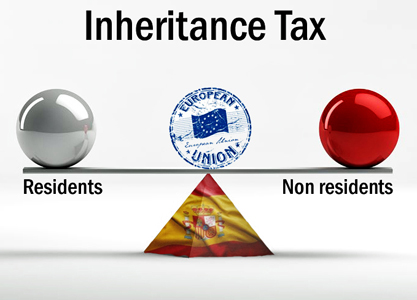Why should you make a Spanish Will for your Spanish Estate

Traditionally, our advice to all our clients was, if you have property in more than one Country, you should make a Will in every Country where you have assets. It seems to make sense, that whether you have a few million, or a few pounds or euros, in England, Ireland or elsewhere, make an Will, then if you also have a villa in Spain, or a small sum in a Bank there, make a Spanish Will.
That way each jurisdiction can get on with the formalities of putting the terms of your Will into effect as soon as possible after you pass on, with no need for the Spanish authorities to wait until the your national Probate Registry and Tax officials have finished with your papers in your country.
The European Succession Regulation No.650/2012 (or “Brussels IV”) came into force last year, but England, Ireland or Denmark are still not signatories to it. This new regulation is supposed to make things simpler for other citizens with property in other Countries of Europe. Basically, you can now say in your national Will that it should dispose of all of your assets, both in Ireland, England and Europe and that the Laws of Succession of your country should apply.
As an example, under the Laws of Succession of England, you can leave your belongings to whoever you choose in your Will. There is no requirement in England, as there is in other Countries [including Scotland even] that certain persons – usually spouse and /or children – should take a share of your estate as a matter of law. So if you are English, make your Will in England and elect English Succession law, then Brussels IV will tell the Spanish authorities that they must not seek to impose their own usual forced heirships upon your wishes.
Unfortunately, there will always be room for problems to arise. There are many legal issues arising from scenarios involving unusual combinations of place of residence, country of citizenship, and country of domicile, from which scope for extensive argument and additional expense can arise.
The first thing you will need to prove to the Spanish authorities is that your Will was validly made in your country. They will not so much be impressed by the fact that the Will is stated to have been signed in the presence of two witnesses, as alarmed by the fact that it may not have any Notary stamp or certificate – They may also say; “I’ve never dealt with this before. The Will is in English. I can’t read English. What is the Probate Registry of Dublin, Leeds etc, and what are its powers?”
There are likely to be other areas of “mismatch” when seeking to persuade Spanish authorities to accept a Will made under a foreign jurisdiction as valid.
Some foreign requirements pertaining to Wills seem very sensible. In the Philippines, a blind person cannot make a valid Will unless “Article 808. If the testator is blind, the Will shall be read to him twice; once, by one of the subscribing witnesses, and again, by the notary public before whom the will is acknowledged” (Civil Code of the Philippines).
In Ireland, a blind person can make a Will but it cannot be admitted to Probate unless one of the witnesses gives a sworn statement about what took place. So again, problems can be envisaged in such a case where the Testator has outlived his witnesses and no such sworn statement was made.
This could, at the end, lead our clients to follow a more expensive and time consuming procedure in order to register the property in Spain, than simply executing a properly laid out Spanish Will. Therefore, our conclusion remains that the new Law also does create some new problems. It still remains simpler and cheaper for those who have an estate in Spain to make a separate Will regulating separately solely their Spanish estate.
It is advisable to revise your previous Will to ensure that is adapted to the Brussels IV new regulation.
For practical reasons, we keep on insisting on making a Spanish Will to cater for the inheritance of your Spanish estate. In the end, it will save time money.


